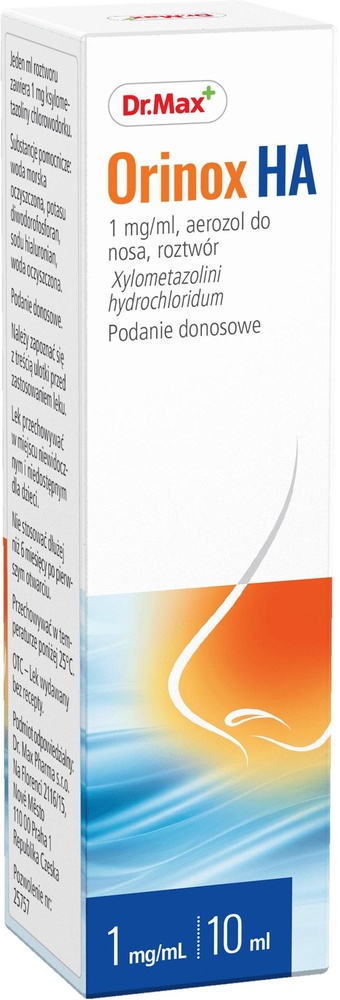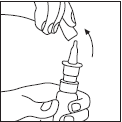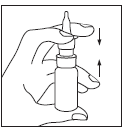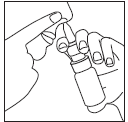

Orinox Ha

Ask a doctor about a prescription for Orinox Ha

How to use Orinox Ha
Package Leaflet: Information for the Patient
Orinox HA, 1 mg/mL, Nasal Spray, Solution
Xylometazoline Hydrochloride
Read the package leaflet carefully before using the medicine, as it contains important information for the patient.
This medicine should always be used exactly as described in the package leaflet for the patient or as advised by a doctor or pharmacist.
- This leaflet should be kept in case it needs to be read again.
- If advice or additional information is needed, a pharmacist should be consulted.
- If the patient experiences any side effects, including any possible side effects not listed in the leaflet, they should inform their doctor or pharmacist. See section 4.
- If there is no improvement after 5 days or the patient feels worse, they should contact their doctor.
Table of Contents of the Leaflet:
- 1. What is Orinox HA and what is it used for
- 2. Important information before using Orinox HA
- 3. How to use Orinox HA
- 4. Possible side effects
- 5. How to store Orinox HA
- 6. Contents of the pack and other information
1. What is Orinox HA and what is it used for
Orinox HA belongs to a group of medicines called sympathomimetics, which are used to treat nasal diseases. The medicine contains xylometazoline hydrochloride as the active substance, which reduces nasal congestion by decreasing the swelling of the nasal mucosa.
Orinox HA is used for the symptomatic treatment of nasal congestion with nasal discharge caused by a cold or sinusitis.
The effect of the medicine starts within a few minutes and lasts for several hours.
Orinox HA is indicated for use in adults and adolescents over 12 years of age.
2. Important information before using Orinox HA
When not to use Orinox HA:
Warnings and precautions
Before starting to use Orinox HA, the patient should discuss it with their doctor or pharmacist:
Prolonged use of Orinox HA, like other similar medicines, may lead to chronic swelling of the nasal mucosa, which can ultimately cause its atrophy (thinning).
To avoid this, the treatment time should be limited to a minimum (see section 3).
Long-term and excessive use of the medicine should be avoided, especially in children.
The duration of treatment in children should always be consulted with a doctor.
If the patient thinks they have a bacterial infection in the nose and sinuses, they should consult a doctor, as the infection needs to be treated properly.
Eye and mouth contact with the medicine should be avoided.
Like other similar medicines, Orinox HA may cause sleep disturbances, dizziness, and tremors in sensitive individuals.
If symptoms worsen, the patient should contact their doctor.
Children
Orinox HA, 1 mg/mL, nasal spray, solution should not be used in children under 12 years of age.
Other pharmaceutical forms may be more suitable for this group of patients.
Orinox HA and other medicines
The patient should tell their doctor or pharmacist about all medicines they are currently taking or have recently taken, as well as any medicines they plan to take.
Concomitant use of Orinox HA with monoamine oxidase inhibitors (MAOIs, e.g., tranylcypromine, moclobemide) or use of MAOIs within the last two weeks, or use of tricyclic or tetracyclic antidepressants, or other medicines that may cause an increase in blood pressure (e.g., doxapram, ergotamine, oxytocin), may result in an increase in blood pressure due to the effect of these medicines on the heart and blood vessels.
Therefore, concomitant use of these medicines is not recommended.
An interaction may occur when xylometazoline is used with certain antidepressants, antihypertensives, or medicines for local or general treatment of influenza.
There is a risk of changing the effect of beta-adrenergic receptor blockers (used to treat high blood pressure, certain heart diseases, and increased eye pressure).
When using such medicines, this should be taken into account and the patient should consult their doctor or pharmacist.
Pregnancy, breastfeeding, and fertility
If the patient is pregnant or breastfeeding, thinks they may be pregnant, or plans to have a baby, they should consult their doctor or pharmacist before using this medicine.
Pregnancy
Before using this medicine, the patient should consult their doctor or pharmacist if they are pregnant.
The doctor will decide whether it is safe to use the medicine.
As a precaution, it is recommended to avoid using xylometazoline during pregnancy.
Breastfeeding
The medicine should not be used during breastfeeding, as it is not known whether it passes into breast milk and it cannot be excluded that it may pose a risk to the breastfed child.
The doctor will decide whether to stop breastfeeding or stop the treatment with xylometazoline, taking into account the benefits of breastfeeding for the child and the benefits of the treatment for the mother.
Because overdose can lead to a decrease in milk production, it is especially important not to exceed the recommended dose of xylometazoline during breastfeeding.
Before using any medicine, the patient should consult their doctor or pharmacist.
Driving and using machines
No reduction in the ability to drive and use machines is expected if the medicine is used as described in the package leaflet.
3. How to use Orinox HA
This medicine should always be used exactly as described in the package leaflet for the patient or as advised by a doctor or pharmacist.
In case of doubt, the patient should consult their doctor or pharmacist.
Recommended dose:
Adults and adolescents over 12 years of age:
1 spray into each nostril, no more than 3 times a day.
Orinox HA should not be used for more than 5 days, unless advised by a doctor.
Treatment can be repeated after a few days' break.
The recommended dose should not be exceeded.
If there is no improvement after 5 days of continuous treatment or the patient feels worse, they should contact their doctor.
Use in children
Orinox HA should not be used in children under 12 years of age.
Other pharmaceutical forms may be more suitable for this group of patients.
Method of administration
| Before using the medicine, the patient should blow their nose. | Figure 1 |
| Hold the bottle so that its bottom rests on the thumb and the pump is between the index and middle fingers, as shown in Figure 2. | Figure 2 |
| Insert the pump tip into the nostril, as shown in Figure 3 (do not spray under the nostril). | Figure 3 |
To avoid infection, each bottle with the spray should be used by one person only.
Using a higher dose of Orinox HA than recommended
In case of using too much of this medicine, the patient should immediately contact their doctor or pharmacist.
Overdose can occur with both nasal and oral administration.
Overdose, especially in small children, can cause the following symptoms: anxiety, agitation, hallucinations, or convulsions alternating with a decrease in body temperature, extreme drowsiness up to loss of consciousness (lethargy) and coma.
Other symptoms of overdose may include: pinpoint pupils, or even dilated pupils, sweating, pallor, cyanosis (bluish discoloration) of the skin and mucous membranes, palpitations, and apnea (temporary cessation of breathing).
Missing a dose of Orinox HA
The patient should not take a double dose to make up for a missed dose, but continue using the medicine as advised.
In case of any further doubts about using this medicine, the patient should consult their doctor or pharmacist.
4. Possible side effects
Like all medicines, Orinox HA can cause side effects, although not everybody gets them.
The patient should stop using Orinox HA and immediately contact their doctor if they experience any of the following symptoms (which may be symptoms of an allergic reaction):
- difficulty breathing or swallowing,
- swelling of the face, lips, tongue, or throat,
- severe itching with red rash or blisters (hives).
The following side effects have been reported:
Common(may affect up to 1 in 10 people):
- headache,
- transient and mild symptoms of irritation, such as tingling or dryness of the nasal mucosa and/or throat,
- sneezing,
- nausea.
Uncommon(may affect up to 1 in 100 people):
- feeling of a blocked nose (after the effect of the medicine has ended),
- nasal bleeding.
Rare(may affect up to 1 in 1,000 people):
- dizziness,
- irregular and rapid heartbeat,
- increased blood pressure,
- transient visual disturbances,
- allergic reactions, such as skin rash, itching, swelling.
Very rare(may affect up to 1 in 10,000 people):
- nervousness,
- insomnia,
- arrhythmia (heart rhythm disorders),
- tachycardia (rapid heartbeat).
Reporting side effects
If the patient experiences any side effects, including any possible side effects not listed in the leaflet, they should inform their doctor or pharmacist.
Side effects can be reported directly to the Department for Monitoring of Adverse Reactions to Medicinal Products of the Office for Registration of Medicinal Products, Medical Devices, and Biocidal Products: Al. Jerozolimskie 181C, 02-222 Warsaw, tel.: +48 22 49 21 301, fax: +48 22 49 21 309, website: https://smz.ezdrowie.gov.pl
Side effects can also be reported to the marketing authorization holder.
By reporting side effects, it is possible to gather more information on the safety of the medicine.
5. How to store Orinox HA
The medicine should be stored out of sight and reach of children.
Store in a temperature below 25°C.
The shelf life after opening the bottle is 6 months.
Do not use this medicine after the expiry date stated on the label and carton after EXP.
The expiry date refers to the last day of the month stated.
Medicines should not be disposed of via wastewater or household waste.
The patient should ask their pharmacist how to dispose of medicines that are no longer needed.
This will help protect the environment.
6. Contents of the pack and other information
What Orinox HA contains
- The active substance of the medicine is xylometazoline hydrochloride.
- One milliliter of the solution contains 1 mg of xylometazoline hydrochloride.
- One dose (140 microliters) contains 0.140 milligrams of xylometazoline hydrochloride.
- The other ingredients of the medicine are: purified sea water, potassium dihydrogen phosphate, sodium hyaluronate, purified water.
What Orinox HA looks like and contents of the pack
Orinox HA is a clear, colorless, sterile solution.
10 milliliters of the solution are in a white plastic bottle with a pump spray, nozzle, and protective cap, in a cardboard box.
Marketing authorization holder and manufacturer
Marketing authorization holder:
Dr. Max Pharma s.r.o.
Na Florenci 2116/15, Nové Město
110 00 Prague 1
Czech Republic
tel.: (+420) 516 770 199
Manufacturer:
Jadran - Galenski laboratorij d.d.
Svilno 20
51000 Rijeka
Croatia
This medicine is authorized in the Member States of the European Economic Area under the following names:
Czech Republic:
Xylomax Neo
Poland:
Orinox HA
Slovakia:
Orinox Neo
Romania:
Orinox HA 1 mg/ml spray nazal, soluţie
Date of last revision of the leaflet:
- Country of registration
- Active substance
- Prescription requiredNo
- Manufacturer
- ImporterJadran-Galenski laboratorij d.d.
- This information is for reference only and does not constitute medical advice. Always consult a licensed doctor before taking any medication. Oladoctor is not responsible for medical decisions based on this content.
- Alternatives to Orinox HaDosage form: Aerosol, 0.5 mg/mlActive substance: xylometazolineManufacturer: Basic Pharma Manufacturing B.V.Prescription not requiredDosage form: Aerosol, 1 mg/mlActive substance: xylometazolineManufacturer: Basic Pharma Manufacturing B.V.Prescription not requiredDosage form: Aerosol, 0.5 mg/mlActive substance: xylometazolinePrescription not required
Alternatives to Orinox Ha in other countries
The best alternatives with the same active ingredient and therapeutic effect.
Alternative to Orinox Ha in Ukraine
Alternative to Orinox Ha in Spain
Online doctors for Orinox Ha
Discuss dosage, side effects, interactions, contraindications, and prescription renewal for Orinox Ha – subject to medical assessment and local rules.








